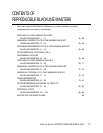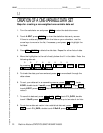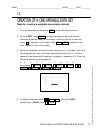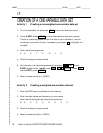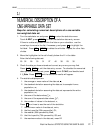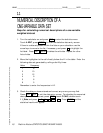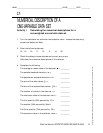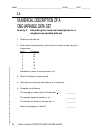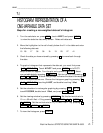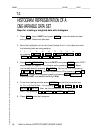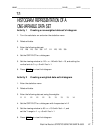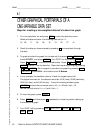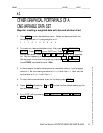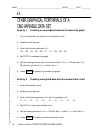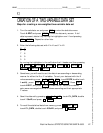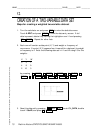
Blackline Masters/STATISTICS USING THE SHARP EL-9600 63
Copyright © 1998, Sharp Electronics Corporation. Permission is granted to photocopy for educational use only.
Steps for creating a non-weighted data set's histogram
1. Turn the calculator on, press STAT , touch A EDIT, and press ENTER
to view the statistics data entry screen. Delete old data sets.
2. Move the highlighter to the cell directly below the L1 in the table and enter
the following data set:
15 28 17 36 38 19 13 25 27 41
3. Check the data you have entered by pressing ▲ to move back through
the data.
4. To graph a histogram that represents the data set, you must first press
2ndF STAT PLOT . Touch A PLOT1 and press ENTER and a PLOT1
setup screen will appear. Turn the plot on by pressing ENTER . Select
one-variable data by pressing ▼ ENTER . Set the list to L1 by pressing ▼
2ndF L1 ENTER . A blank Freq: prompt indicates the data is non-weighted
and the frequencies are one. Choose the histogram graph by pressing ▼
2ndF STAT PLOT , touching A HIST, and double touching 1 Hist.
5. Set the calculator to rectangular graphing by pressing 2ndF SET UP ,
touch E COORD, double touch 1 Rect, and press 2ndF QUIT .
6. Set the viewing window by pressing WINDOW . Set the horizontal axis to
10 < x < 50 with Xscl = 10 by pressing 1 0 ENTER 5 0 ENTER 1
0 ENTER . Set the vertical axis to 0 < y < 5 with Yscl = 1 by pressing 0
ENTER 5 ENTER 1 ENTER .
7. To view the histogram, press GRAPH .
HISTOGRAM REPRESENTATION OF A
ONE-VARIABLE DATA SET
3.1
NAME _____________________________________________________ CLASS __________ DATE __________



